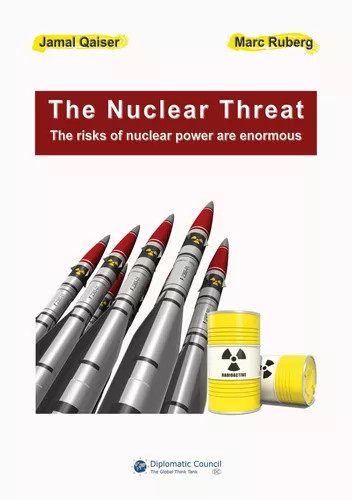Skip to the end of the images gallery Navigation umschalten
Skip to the beginning of the images gallery Navigation umschalten

The Nuclear Threat
The risks of nuclear power are enormous
Gesellschaft, Politik & Medien
Paperback
252 Seiten
ISBN-13: 9783986740481
Verlag: Diplomatic Council e.V.
Erscheinungsdatum: 06.10.2022
Sprache: Englisch
Farbe: Nein
erhältlich als:
CHF 27.50
inkl. MwSt. / portofrei
Ihr eigenes Buch!
Werden Sie Autor*in mit BoD und erfüllen Sie sich den Traum vom eigenen Buch und E-Book.
Mehr erfahrenThe nuclear threat comes from two directions. Firstly, as a result of a possible catastrophe, a maximum conceivable accident that can be assumed, in the peaceful use of nuclear power for energy supply. Secondly, from a likely military escalation to nuclear war. As different as both scenarios are, the consequences can be similarly devastating. In addition, there is the yet unresolved question of "where to dispose of radioactive waste". This question is still unresolved, not only in Germany, but around the globe.
Nevertheless, a renaissance of nuclear power is imminent for several reasons. New mini-reactors promise energy right where it is needed - and big money for investors. The commercial exploitation of nuclear fusion is on the verge of a breakthrough. So far, all nuclear reactors have "only" worked with nuclear fission. Nuclear fusion, which is many times more powerful, has so far only been used in two places: in the sun and other stars, and in atomic bombs. Moreover, there is the foreseeable use of nuclear power in the forthcoming conquest of space, for example to supply energy to settlements on the moon and Mars. Above all, the Damocles sword of military use is hovering in the face of new types of weapons from drones with artificial intelligence and killer satellites in space. The escalation of the conflicts between the United States of America, Russia and China makes the nuclear threat as topical today as it was during the Cold War.
Nevertheless, a renaissance of nuclear power is imminent for several reasons. New mini-reactors promise energy right where it is needed - and big money for investors. The commercial exploitation of nuclear fusion is on the verge of a breakthrough. So far, all nuclear reactors have "only" worked with nuclear fission. Nuclear fusion, which is many times more powerful, has so far only been used in two places: in the sun and other stars, and in atomic bombs. Moreover, there is the foreseeable use of nuclear power in the forthcoming conquest of space, for example to supply energy to settlements on the moon and Mars. Above all, the Damocles sword of military use is hovering in the face of new types of weapons from drones with artificial intelligence and killer satellites in space. The escalation of the conflicts between the United States of America, Russia and China makes the nuclear threat as topical today as it was during the Cold War.
Eigene Bewertung schreiben









Es sind momentan noch keine Pressestimmen vorhanden.